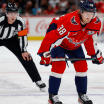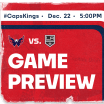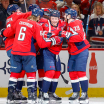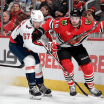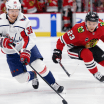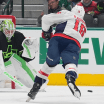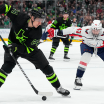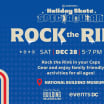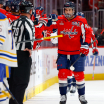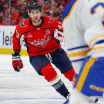Via Chicago - On Wednesday night in the Windy City, the Caps and the Chicago Blackhawks hooked up in an entertaining contest. The first period was quiet, the second was eventful and the third fairly even. For the second time in as many meetings this season, the Caps and Hawks went to overtime, and for the second time Chicago came away with the win. Two weeks ago in Washington, the Hawks took a 4-3 shootout decision. On Wednesday in Chicago, the Caps fell 5-4 in overtime.
POSTGAME NOTEBOOK: Hawks 5, Caps 4 (OT)
Caps forge comeback to claim a point in Backstrom's return, Ovechkin ties Andreychuk's career PPG record and leaps into League scoring lead, more
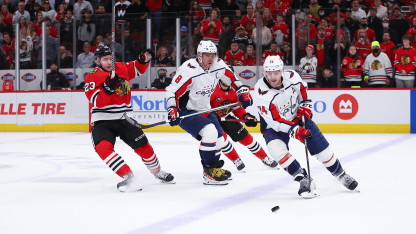
Washington's Wednesday night woes were concentrated in one stretch of 34 seconds in the second period, when the Hawks struck for three goals to take a 3-1 lead. After Alex Ovechkin staked the Caps to a 1-0 advantage with a power-play goal early in the frame, the Hawks cashed in on a 5-on-3 of only 17 seconds in duration, then scored again seconds later on the 5-on-4 portion of the man advantage. Chicago tacked on an insurance tally seconds after that one.
To their credit, the Caps quelled that uprising and began to chip away. Daniel Sprong delivered a huge goal with 41.3 seconds left in the second, shrinking the Chicago lead to a single goal heading into the third. Lars Eller tied it at 3-3 for Washington with 8:03 remaining, but less than two minutes later the Caps went shorthanded for a sixth time when T.J. Oshie was deemed guilty of tripping his old college teammate Jonathan Toews.
On the ensuing power play, the Hawks took a 4-3 lead on Alex DeBrincat's second power-play goal of the game.
Oshie rarely argues calls, but he was incredulous at this one. After the game, he noted that his frustration stemmed from the fact that the call came from the back referee (Dan O'Rourke) who was stationed in the neutral zone, further away from the play than the other referee, Gord Dwyer.
"I just thought that there was a ref - Gordo was in front of me by maybe 10 feet - who had a good view of everything," says Oshie. "And I just thought that the refs maybe should have trusted each other a little bit on what was happening, since the call was made behind us by about a hundred feet.
"But they're human just like us. I definitely didn't have a perfect game out there. In the heat of the moment, I don't like to react like that. But tonight I did, and I'll apologize the next time we see each other and we'll move forward."
In the waning seconds of the game, Oshie gained the Chicago zone on the sequence that resulted in Conor Sheary's tying goal with three seconds left in regulation, carefully navigating his way across the blueline in a fashion that survived a subsequent video review that showed he was onside.
After the game, the NHL's situation room sent out an email with the following explanation of the review:
Video review confirmed T.J Oshie had possession and control of the puck as he entered the attacking zone prior to Conor Sheary's goal. Rule 83.1 states in part, "a player actually controlling the puck who shall cross the line ahead of the puck shall not be considered 'off-side,' provided he had possession and control of the puck prior to his skates crossing the leading edge of the blue line."(Bold and italics theirs.)
Oshie added his own thoughts on Rule 83.1 after the game.
"I think it's a fantastic rule that they brought in, I'm not sure how many years ago it was," says the Washington winger. "But if you have possession of the puck, that your feet can go over the line. I tried to drag my leg as best as I could. Once I felt I had control of the puck, I knew I was good. The coaches were asking me on the bench [during the video review] and I said I was good. We watched it and it looked good. I'm just glad I had my thinking cap on there at that moment, and I thought to drag the leg and that we were able sneak out a point after it."
Sometime To Return -Teammates, fans of the game around the world and media were happy to see Nicklas Backstrom back in action for the Capitals on Wednesday night in Chicago, playing his first NHL game in nearly seven months. Backstrom spent the last several months rehabbing an ailing left hip, and he missed Washington's first 28 games of the season.
"Everything felt good," says Backstrom. "The hip felt good, and it's just that I haven't played a game in a while, so it's going to take a couple of games to get my timing back and stuff. But we battled back for a point. That's important."
While Backstrom's teammates have grown accustomed to playing in front of full houses of fans again, that was an experience Backstrom hadn't had in 21 months, until Wednesday.
"It was great," he says. "I think I've been missing that a lot. Just playing the game again in front of fans, it's been a long time for me and everyone else. It's so much different from the year that we had last year, so it's great."
Over the course of his previous 14 seasons in the League, Backstrom has been a durable player. The 34-year-old center played in every one of Washington's games in seven of those 14 seasons, and missed two or fewer games in two other campaigns. Aside from the 2011-12 season when a concussion sidelined him for 40 games, he has never missed more than eight games in any campaign.
"Obviously two different injuries," says Backstrom of the concussion he suffered nearly a decade ago and his hip ailment this season. "But that first one 10 years ago I couldn't really do anything about. I just had to wait it out. This one, I was just thinking about my future career, and I want to be good for many years to come. So I had to take this decision, and obviously the organization was on board as well, so we took it together.
"When you're out for a long time, you've just got to stay positive. You've got to see the light at the end of the tunnel. You come to the rink having fun with the boys, that's what it's all about, and hanging out with them. I got to do that anyway, even if I didn't practice with them. You've just got to stay positive, and eventually you will play a game again, like today."
That the Caps were able to sustain such a strong start to their 2021-22 season without their likely future Hall of Fame center is a credit to all of them, but they're a much better team with No. 19 back in their lineup.
"Just a solid presence on the ice, in the locker room," says Oshie. It's so great to have him back; he's such a big part of everything that we do here. Him and [Alex Ovechkin] and Johnny [Carlson] are the pillars, and the rest of us kind of fill the other spots.
"His leadership, his poise, his hockey sense on the ice, everything was big for us today. For being off as long as he was, I thought he had a great game. It's always nice lining up next to [No.] 19 out there."
"I thought he played well," says Caps coach Peter Laviolette. "He made good plays out there. I thought he looked good; it was typical Nick. He's smart, he sees the ice, he sees the plays, and I thought he played a good game, being out that long. He's trying to catch a moving train, and I thought he did a really good job."
Backstrom didn't show any noticeable signs of his long layoff. He skated 18:14 over 18 shifts, including 3:34 in power play time and 20 seconds worth of shorthanded duty. He squeezed off five shots on net and had seven shot attempts, laid a pair of hits and won seven of his 15 face-offs on the night. He also collected a secondary assist on the Caps' first goal of the game, an Ovechkin power-play marker, a goal that tied the League's all-time record for most power-play goals (more on that in just a bit).
Asked whether it was fitting that Backstrom had a hand in Ovechkin climbing to the very top of the career power-play goals ladder, Oshie responded affirmatively.
"I would think so, yeah," says Oshie. "I didn't think he was getting out of here tonight without an assist. I bet that felt good for him. We're happy for him. He worked harder than probably anyone I've ever seen to get back. If we were there for three hours, he was there for probably five or six hours. So hats off to him, I'm really happy for him. And especially for the kids to see dad on the ice again."
Raw Power -Ovechkin's power-play goal early in the second period was the 274th extra-man tally of his NHL career, tying him with Dave Andreychuk for the top spot on the NHL's power-play goal ledger.
With his goal and with an assist on Sheary's tying goal in the waning seconds of regulation, Ovechkin leapt into the top spot in the League scoring race with 46 points (21 goals, 25 assists), marking the first time he has held the lead spot outright since March 20, 2015. Only twice in NHL history has a player aged 36 or older finished the season as the League's top point scorer. Bill Cook of the New York Rangers achieved the feat in 1932-33 and Tampa Bay's Martin St. Louis followed in Cook's skate-steps 80 years later, in 2012-13. Both St. Louis and Cook had 48-game seasons in those campaigns.
Ovechkin's goal was also the 25th of his career against Hawks goalie Marc-Andre Fleury, the most he has scored against any one goaltender. Ovechkin has tallied 24 times against ex-Rangers goalie Henrik Lundqvist.
The Hawks feted Fleury with a heartwarming pregame ceremony to honor his 500th career win, achieved last week in Montreal. Fleury joins Martin Brodeur (691) and Patrick Roy (551) as just the third goaltender in League history to reach the 500-won plateau.
Save The Overtime (For Me) - Washington dropped its sixth straight overtime decision on Wednesday night in Chicago, establishing a franchise mark for most consecutive overtime losses in the regular season.
From Nov. 13, 2010 through Jan. 18, 2011, the Caps dropped five straight games in overtime. That streak came to an end when the Caps forged a 2-1 overtime victory over the New York Islanders in Washington on March 1, 2011, which ended up being the first of 10 straight overtime victories for the Capitals, matching a franchise record. The Caps also won 10 straight overtime decisions from Oct. 31, 1984 through Jan. 1, 1987.
By The Numbers - Carlson led the Caps with 27:19 in ice time … Ovechkin led the Caps with 10 shots on net and 11 shot attempts … Trevor van Riemsdyk led the Caps with five hits … Carlson blocked four shots to lead Washington.

